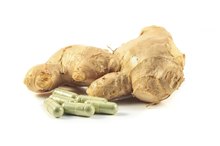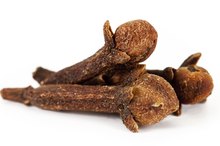How to Get Rid of Food Poisoning Fast
If that chicken sandwich tasted or smelled slightly off, you could be in for a world of gastrointestinal hurt. Food poisoning affects some 76 million Americans each year, according to MedlinePlus. Food poisoning occurs because what you put in your mouth has been contaminated by bacteria, viruses or parasites. At first you may be besieged by a host of unpleasant symptoms, such as nausea, vomiting, diarrhea, fever and the fervent wish to be rendered unconscious so you won't have to suffer through another minute. Food poisoning typically resolves within 48 hours, says MayoClinic.com 1. However, there are ways to expedite your recovery.
Give your tummy a break. Avoid eating and drinking for a few hours, advises MayoClinic.com. Get plenty of rest while you're at it–food poisoning can leave you feeling tired and dehydrated.
How to Take Ginger Pills for Motion Sickness
Learn More
Hydrate. The best thing you can do to treat food poisoning is to increase your liquid intake whenever you can keep something down. MayoClinic.com advises sucking on ice chips. Alternatively, take small sips of water, clear decaffeinated soda or a sports drink.
Try ginger. Integrative physician Dr. Andrew Weil says that his "top remedy" for nausea is any type of ginger 4. Mix a 1/2 tsp. of powdered ginger with water, take two ginger capsules, nibble on ginger candy or sip on ginger ale. Make sure that you use real ginger–many soda pops contain only artificial ginger flavoring.
How to Get Rid of a Champagne Headache
Learn More
Ease back into eating. Once your stomach settles, MayoClinic.Com advises choosing bland foods that are easy on your stomach, such as crackers, toast, bananas, plain rice and gelatin. Avoid caffeine, alcohol and fatty or spicy foods. If you feel your tummy roiling after you eat, take another break.
Tips
If you can't find real ginger ale, Dr. Weil advises mixing ginger syrup with seltzer water.
Warnings
Don't take over-the-counter medications for diarrhea that contain loperamide or diphenoxylate with atropine–these can slow down the rate at which bacteria and other germs are expelled from your body. The Centers for Disease Control recommends drinking oral rehydration solutions for severe diarrhea, such as Ceralyte, Pedialyte or Oralyte to prevent dehydration.
Avoid using nicotine when you have food poisoning.
Related Articles
References
- MayoClinic.com: Food Poisoning-Lifestyle and Home Remedies
- Centers for Disease Control: Foodborne Illnesses-General Information
- MedlinePlus: Foodborne Illnesses
- Dr. Andrew Weil: Nausea
- Ryan JL. Treatment of chemotherapy-induced nausea in cancer patients. Eur Oncol. 2010;6(2):14-16.
- Marx W, Ried K, McCarthy AL, et al. Ginger-mechanism of action in chemotherapy-induced nausea and vomiting: A review. Crit Rev Food Sci Nutr. 2017;57(1):141–146. doi:10.1080/10408398.2013.865590
- Panahi Y, Saadat A, Sahebkar A, Hashemian F, Taghikhani M, Abolhasani E. Effect of ginger on acute and delayed chemotherapy-induced nausea and vomiting: a pilot, randomized, open-label clinical trial. Integr Cancer Ther. 2012;11(3):204–211. doi:10.1177/1534735411433201
- Haniadka R, Rajeev AG, Palatty PL, Arora R, Baliga MS. Zingiber officinale (ginger) as an anti-emetic in cancer chemotherapy: a review. J Altern Complement Med. 2012;18(5):440–444. doi:10.1089/acm.2010.0737
- Arslan M, Ozdemir L. Oral intake of ginger for chemotherapy-induced nausea and vomiting among women with breast cancer. Clin J Oncol Nurs. 2015;19(5):E92–E97. doi:10.1188/15.CJON.E92-E97
- Bossi P, Cortinovis D, Fatigoni S, et al. A randomized, double-blind, placebo-controlled, multicenter study of a ginger extract in the management of chemotherapy-induced nausea and vomiting (CINV) in patients receiving high-dose cisplatin. Ann Oncol. 2017;28(10):2547–2551. doi:10.1093/annonc/mdx315
- Palatty PL, Haniadka R, Valder B, Arora R, Baliga MS. Ginger in the prevention of nausea and vomiting: a review. Crit Rev Food Sci Nutr. 2013;53(7):659-69. doi:10.1080/10408398.2011.553751
- WholeHealth Chicago. Ginger. Updated May 12, 2009.
- Oncology Nutrition: a Dietetic Practice Group of the Academy of Nutrition and Dietetics. Dietary supplements.
- Marx W, Mckavanagh D, Mccarthy AL, et al. The effect of ginger (Zingiber officinale) on platelet aggregation: a systematic literature review. PLoS ONE. 2015;10(11):e0143675. doi:10.1371/journal.pone.0141119
- Chuah SK, Wu KL, Tai WC, Changchien CS. The effects of ginger on gallbladder motility in healthy male humans. J Neurogastroenterol Motil. 2011;17(4):411-5. doi:10.5056/jnm.2011.17.4.411
- National Center for Complementary and integrative Health. Ginger. Updated November 30, 2016.
- Bossi, P., Cortinovis, D., Fatigoni, et al. A Randomized, Double Blind, Placebo-Controlled, Multicenter Study of a Ginger Extract in the Management of Chemotherapy Induced Nausea and Vomiting (CINV) in Patients Receiving High Dose Cisplatin. Annals of Oncology. 2017. 28(10):2547-2551.
- Haniadka, R. et al. Zingiber officinale (Ginger) as an Anti-Emetic in Cancer Chemotherapy: A Review. Journal of Complementary and Alternative Medicine. 2012.18(5):440-4.
- Jordan, K., Jahn, F., and M. Aapro. Recent developments in the prevention of chemotherapy-induced nausea and vomiting (CINV): a comprehensive review. Annals of Oncology. 2015.26(6):1081-90.
- Pillai, A. et al. Anti-emetic effect of ginger powder versus placebo as an add-on therapy in children and young adults receiving high emetogenic chemotherapy. Pediatric Blood and Cancer.2011.56(2):234-8.
Writer Bio
Lisa Sefcik has been writing professionally since 1987. Her subject matter includes pet care, travel, consumer reviews, classical music and entertainment. She's worked as a policy analyst, news reporter and freelance writer/columnist for Cox Publications and numerous national print publications. Sefcik holds a paralegal certification as well as degrees in journalism and piano performance from the University of Texas at Austin.









